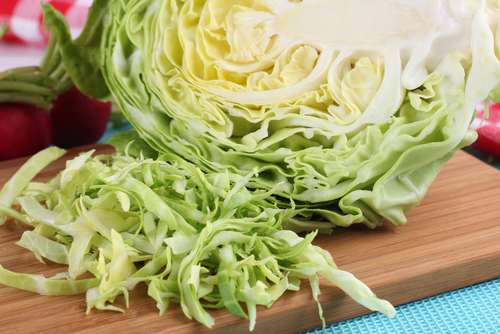
Jump to
Short answer
No, cabbage is not bad for you. In fact, the cruciferous vegetable is very good for you and it provides many health benefits: improved digestion, heart health, and even cancer prevention.
Long answer
A member of the cruciferous vegetable family, cabbage is packed full of vital nutrients: vitamins A, C and K for starters, plus calcium, potassium, folate, and fiber.
Fiber, combined with cabbage’s high water content, helps improve your all-around digestion health. Eating adequate fiber promotes regularity and prevents constipation. Additionally, cabbage juice has been shown to heal ulcers. It contains vitamin U (S methylmethionine) which research has linked to the increased repair of peptic ulcers.
Cabbage is also good for your heart. The leafy green is rich in minerals such as potassium, phosphorous, calcium, manganese, magnesium and iron. Regular consumption of these minerals benefits your cardiovascular system by controlling heart rate and lowering blood pressure.
The most impressive benefit of cabbage is its role in reducing certain types of cancer. Cabbage contains sulforaphane, a cancer-fighting nutrient. Over the past three decades, research has consistently correlated cruciferous vegetables (which are all rich in sulforaphane) with an overall reduced risk of cancer. Cabbage has also been shown to be particularly effective in fighting certain types of cancer. A recent study by the University of Missouri revealed that apigenin—a flavonoid found in cabbage and other vegetables—helped decrease tumor size in breast cancer patients.
So where do people get the idea that cabbage could be bad for you?
Simply stated: anything in excess is bad for you, even a nutrient-rich vegetable like cabbage. Eating large quantities of cabbage can cause negative side effects. Most of these are uncomfortable (stomach cramps), embarrassing (flatulence) or disagreeable (diarrhea)... but they are not incredibly dangerous.
However, eating too much cabbage can interfere with certain medications. For instance, if you take blood thinners, you need to be careful about the amount of vitamin K you consume, as the nutrient plays a crucial role in blood clotting. So how much is too much? A cup of green cabbage contains approximately 53 micrograms of vitamin K, which is about half the daily recommended value. That being said, you would have to consume well over three cups of cabbage per day to venture into the “risk zone.” Even so, you should still consult your physician prior to adding more cabbage (or any food/substance rich in vitamin K) to your diet.
All in all, cabbage is good for most of us and provides many benefits when incorporated into the diet on a regular basis. But don’t get carried away—a healthy diet is all about finding the right balance. It is not centered around any one miracle food in particular... and that includes cabbage.
Possible short-term side effects
- flatulence
- stomach cramps
- diarrhea

Benefits
- improves digestion
- promotes regularity
- helps heal stomach ulcers
- heart health
- reduces risk of certain types of cancer
 Approved by
Approved by 














